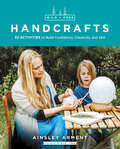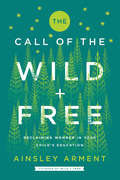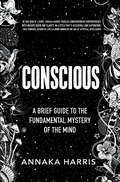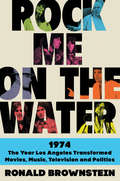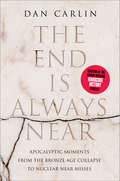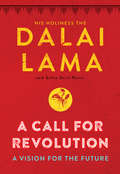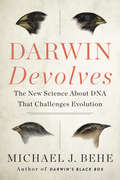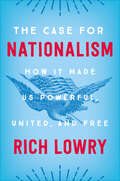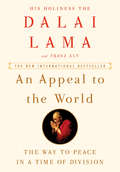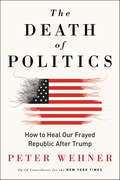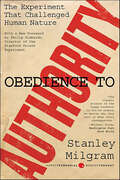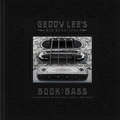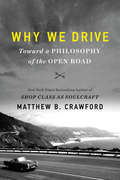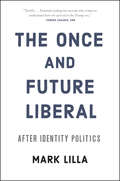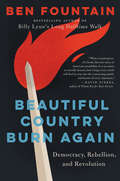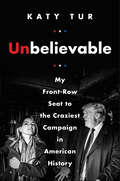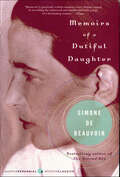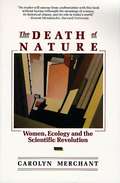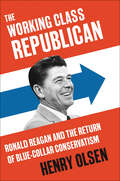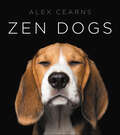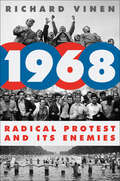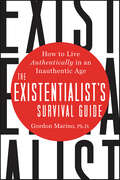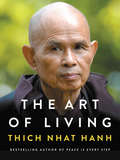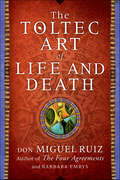- Table View
- List View
Wild and Free Handcrafts AFF: 32 Activities to Build Confidence, Creativity, and Skill (Wild and Free)
by Ainsley ArmentThe companion to The Call of the Wild + Free: styled in the lush aesthetic of the Wild + Free brand, a four-color book offering crafts, activities, and essays, that parents, educators, and caregivers can use to inspire their children.Wild + Free Handcrafts is a beautiful, four-color resource book for parents, educators, and caregivers to enjoy doing hands-on activities with kids. A handcraft engages one’s hands, requires a level of learned skill, encourages children to do their best work, and produces an end product that is useful. It has been used in homeschool settings for decades as one way to encourage them to work with their hands and discover a skillful craft they love to practice. It also is a great way for traditionally educated kids who are home for the summer, or in afterschool programs, or with their families on the weekends, to do fun activities that will stimulate their imaginations and creativity. This book will feature crafts such as:Felted acornsPaper beadsNature wreathsCocoa mint lip balmWoven willow hearts Finger knit bracelets Eco-dyed kitchen towels Fairy tale treehouse Flower crowns Bug hotel With the same lush photography as The Call of the Wild + Free, this book includes step-by-step pictures that show parents how to do the craft, and essays on the usefulness and purpose of handcrafts as a tool to spark children’s curiosity and wonder.
The Call of the Wild and Free: Reclaiming Wonder in Your Child's Education (Wild and Free)
by Ainsley ArmentAllow your children to experience the adventure, freedom, and wonder of childhood with this practical guide that provides all the information, inspiration, and advice you need for creating a modern, quality homeschool education.Inspired by the spirit of Henry David Thoreau—”All good things are wild and free”—mother of five Ainsley Arment founded Wild + Free. This growing online community of mothers and families want their children to receive a quality education at home by challenging their intellectual abilities and nurturing their sense of curiosity, joy and awe—the essence of a positive childhood. The homeschool approach of past generations is gone—including the stigma of socially awkward kids, conservative clothes, and a classroom setting replicated in the home. The Wild + Free movement is focused on a love of nature, reading great books, pursuing interests and hobbies, making the entire world a classroom, and prolonging the wonder of childhood, an appealing philosophy that is unpacked in the pages of this bookThe Call of the Wild and Free offers advice, information, and positive encouragement for parents considering homeschooling, those currently in the trenches looking for inspiration, as well as parents, educators, and caregivers who want supplementary resources to enhance their kids’ traditional educations.
Conscious: A Brief Guide to the Fundamental Mystery of the Mind
by Annaka HarrisAs concise and enlightening as Seven Brief Lessons on Physics and Astrophysics for People in a Hurry, this mind-expanding dive into the mystery of consciousness is an illuminating meditation on the self, free will, and felt experience.What is consciousness? How does it arise? And why does it exist? We take our experience of being in the world for granted. But the very existence of consciousness raises profound questions: Why would any collection of matter in the universe be conscious? How are we able to think about this? And why should we?In this wonderfully accessible book, Annaka Harris guides us through the evolving definitions, philosophies, and scientific findings that probe our limited understanding of consciousness. Where does it reside, and what gives rise to it? Could it be an illusion, or a universal property of all matter? As we try to understand consciousness, we must grapple with how to define it and, in the age of artificial intelligence, who or what might possess it. Conscious offers lively and challenging arguments that alter our ideas about consciousness—allowing us to think freely about it for ourselves, if indeed we can.
Rock Me on the Water: 1974-The Year Los Angeles Transformed Movies, Music, Television, and Politics
by Ronald BrownsteinIn this exceptional cultural history, Atlantic Senior Editor Ronald Brownstein—“one of America's best political journalists (The Economist)—tells the kaleidoscopic story of one monumental year that marked the city of Los Angeles’ creative peak, a glittering moment when popular culture was ahead of politics in predicting what America would become. <P><P>Los Angeles in 1974 exerted more influence over popular culture than any other city in America. Los Angeles that year, in fact, dominated popular culture more than it ever had before, or would again. Working in film, recording, and television studios around Sunset Boulevard, living in Brentwood and Beverly Hills or amid the flickering lights of the Hollywood Hills, a cluster of transformative talents produced an explosion in popular culture which reflected the demographic, social, and cultural realities of a changing America. At a time when Richard Nixon won two presidential elections with a message of backlash against the social changes unleashed by the sixties, popular culture was ahead of politics in predicting what America would become. The early 1970s in Los Angeles was the time and the place where conservatives definitively lost the battle to control popular culture. <P><P>Rock Me on the Water traces the confluence of movies, music, television, and politics in Los Angeles month by month through that transformative, magical year. Ronald Brownstein reveals how 1974 represented a confrontation between a massive younger generation intent on change, and a political order rooted in the status quo. Today, we are again witnessing a generational cultural divide. Brownstein shows how the voices resistant to change may win the political battle for a time, but they cannot hold back the future. <P><P><b>A New York Times Bestseller</b>
The End Is Always Near: Apocalyptic Moments, from the Bronze Age Collapse to Nuclear Near Misses
by Dan CarlinThe creator of the wildly popular award-winning podcast Hardcore History looks at some of the apocalyptic moments from the past as a way to frame the challenges of the future.Do tough times create tougher people? Can humanity handle the power of its weapons without destroying itself? Will human technology or capabilities ever peak or regress? No one knows the answers to such questions, but no one asks them in a more interesting way than Dan Carlin.In The End is Always Near, Dan Carlin looks at questions and historical events that force us to consider what sounds like fantasy; that we might suffer the same fate that all previous eras did. Will our world ever become a ruin for future archaeologists to dig up and explore? The questions themselves are both philosophical and like something out of The Twilight Zone.Combining his trademark mix of storytelling, history and weirdness Dan Carlin connects the past and future in fascinating and colorful ways. At the same time the questions he asks us to consider involve the most important issue imaginable: human survival. From the collapse of the Bronze Age to the challenges of the nuclear era the issue has hung over humanity like a persistent Sword of Damocles.Inspired by his podcast, The End is Always Near challenges the way we look at the past and ourselves. In this absorbing compendium, Carlin embarks on a whole new set of stories and major cliffhangers that will keep readers enthralled. Idiosyncratic and erudite, offbeat yet profound, The End is Always Near examines issues that are rarely presented, and makes the past immediately relevant to our very turbulent present.
A Call for Revolution: A Vision for the Future
by Dalai Lama Sofia Stril-ReverTHE INTERNATIONAL BESTSELLER * A LIBRARY JOURNAL BEST BOOK OF THE YEAR * A SPIRITUALITY & PRACTICE BOOK AWARD WINNER* A NAUTILUS BOOK AWARD WINNERA Landmark Message from His Holiness the Dalai Lama: Are we ready to hear it? Are we ready to act?I call on you to confront the challenges of our era by rising up and embarking upon a revolution that has no precedent in human historyThis eloquent, urgent manifesto is possibly the most important message the Dalai Lama can give us about the future of our world. It’s his rallying cry, full of solutions for our chaotic, aggressive, divided times: no less than A CALL FOR REVOLUTION.
Darwin Devolves: The New Science About DNA That Challenges Evolution
by Michael J. BeheThe scientist who has been dubbed the “Father of Intelligent Design” and author of the groundbreaking book Darwin’s Black Box contends that recent scientific discoveries further disprove Darwinism and strengthen the case for an intelligent creator. In his controversial bestseller Darwin’s Black Box, biochemist Michael Behe challenged Darwin’s theory of evolution, arguing that science itself has proven that intelligent design is a better explanation for the origin of life. In Darwin Devolves, Behe advances his argument, presenting new research that offers a startling reconsideration of how Darwin’s mechanism works, weakening the theory’s validity even more. A system of natural selection acting on random mutation, evolution can help make something look and act differently. But evolution never creates something organically. Behe contends that Darwinism actually works by a process of devolution—damaging cells in DNA in order to create something new at the lowest biological levels. This is important, he makes clear, because it shows the Darwinian process cannot explain the creation of life itself. “A process that so easily tears down sophisticated machinery is not one which will build complex, functional systems,” he writes.In addition to disputing the methodology of Darwinism and how it conflicts with the concept of creation, Behe reveals that what makes Intelligent Design unique—and right—is that it acknowledges causation. Evolution proposes that organisms living today are descended with modification from organisms that lived in the distant past. But Intelligent Design goes a step further asking, what caused such astounding changes to take place? What is the reason or mechanism for evolution? For Behe, this is what makes Intelligent Design so important.
The Case for Nationalism: How It Made Us Powerful, United, and Free
by Rich Lowry“Rich Lowry not only makes an original and compelling case for nationalism but also carefully demonstrates how throughout Western history and literature, enlightened nationhood was the glue that held diverse democratic societies together in peace and kept them safe in war. A fascinating, erudite—and much-needed—defense of a hallowed idea unfairly under current attack.” — Victor Davis Hanson“America is an idea, but it’s not only an idea: America is also a nation with flesh-and-blood people, particular lands with real borders, and its own history and culture. Rich Lowry’s learned and brisk The Case for Nationalism defends these unfashionable truths against transnational assault from both the left and the right while reminding us that nationalist sentiments are essential to self-government.” — Tom Cotton“Rich Lowry’s The Case for Nationalism is a massively important exploration of what nationalism really means, how it has been radically misinterpreted, and why American nationalism, properly construed, is essential to the project of restoring unity and purpose in our country.” — Ben Shapiro“Anyone who loves freedom knows that nothing today is more tragically misunderstood than the vital subject of this important book. I thank God that someone of the caliber of my friend Rich Lowry has taken it on as he so brilliantly has!” — Eric Metaxas
An Appeal to the World: The Way to Peace in a Time of Division
by Dalai Lama Franz Alt#1 INTERNATIONAL BESTSELLER • FEATURES EXCLUSIVE NEW MATERIAL ON THE TRUMP PRESIDENCY "Makes the case for unity in a world rife with divisions." —New York Times Book ReviewIn this brief yet profound address to global humanity, His Holiness the Dalai Lama of Tibet reveals that we all hold the seeds of world peace within us: “I see with ever greater clarity that our spiritual well-being depends,” the Nobel Peace Prize winner writes, “on our innate human nature, our natural affinity for goodness, compassion, and caring for others.”Already a major international bestseller, An Appeal to the World, the new book by one of the most revered spiritual leaders of our time, outlines both the inward and outward paths to peace, addressing a wide range of contemporary topics—from the rise of nationalism, Trump presidency, refugee crisis, climate catastrophes, and materialism to meditation, universal ethics, and even neuroscience. Here is a small book that can truly change the world.
The Death of Politics: How to Heal Our Frayed Republic After Trump
by Peter WehnerThe New York Times opinion writer, media commentator, outspoken Republican and Christian critic of the Trump presidency offers a spirited defense of politics and its virtuous and critical role in maintaining our democracy and what we must do to save it before it is too late. “Any nation that elects Donald Trump to be its president has a remarkably low view of politics.” Frustrated and feeling betrayed, Americans have come to loathe politics with disastrous results, argues Peter Wehner. In this timely manifesto, the veteran of three Republican administrations and man of faith offers a reasoned and persuasive argument for restoring “politics” as a worthy calling to a cynical and disillusioned generation of Americans. Wehner has long been one of the leading conservative critics of Donald Trump and his effect on the Republican Party. In this impassioned book, he makes clear that unless we overcome the despair that has caused citizens to abandon hope in the primary means for improving our world—the political process—we will not only fall victim to despots but hasten the decline of what has truly made America great. Drawing on history and experience, he reminds us of the hard lessons we have learned about how we rule ourselves—why we have checks and balances, why no one is above the law, why we defend the rights of even those we disagree with. Wehner believes we can turn the country around, but only if we abandon our hatred and learn to appreciate and honor the unique and noble American tradition of doing “politics.” If we want the great American experiment to continue and to once again prosper, we must once more take up the responsibility each and every one of us as citizens share.
Obedience to Authority: The Experiment That Challenged Human Nature
by Stanley MilgramA part of Harper Perennial’s special “Resistance Library” highlighting classic works that illuminate our times: A special edition reissue of Stanley Milgram’s landmark examination of humanity’s susceptibility to authoritarianism.“The classic account of the human tendency to follow orders, no matter who they hurt or what their consequences.” — Washington Post Book WorldIn the 1960s, Yale University psychologist Stanley Milgram famously carried out a series of experiments that forever changed our perceptions of morality and free will. The subjects—or “teachers”—were instructed to administer electroshocks to a human “learner,” with the shocks becoming progressively more powerful and painful. Controversial but now strongly vindicated by the scientific community, these experiments attempted to determine to what extent people will obey orders from authority figures regardless of consequences. “Milgram’s experiments on obedience have made us more aware of the dangers of uncritically accepting authority,” wrote Peter Singer in the New York Times Book Review. With an introduction from Dr. Philip Zimbardo, who conducted the famous Stanford Prison Experiment, Obedience to Authority is Milgram’s fascinating and troubling chronicle of his classic study and a vivid and persuasive explanation of his conclusions.
Geddy Lee's Big Beautiful Book of Bass
by Geddy LeeRock ‘n’ Roll Hall of Famer and Rush bassist Geddy Lee celebrates rock music’s thunderous, rumbly bottom end—the bass—in this unique, lavishly illustrated, full-color compendium showcasing over two hundred rare, iconic, beautiful, and sometimes eccentric bass guitars from his extensive collection. <P><P>In this luxurious keepsake volume, Geddy Lee chronicles the fascinating history of one of rock music’s foundation instruments, the bass guitar. Written with arts journalist Daniel Richler, gorgeously photographed by Richard Sibbals, and with insight from Geddy’s trusted bass tech and curator, John "Skully" McIntosh, Geddy Lee’s Big Beautiful Book of Bass profiles over two hundred classic basses from Geddy’s extensive collection. <P><P>The book combines knowledge and observations gleaned from Geddy’s long, successful career with new and behind-the-scenes photos, ranging from his earliest days to Rush’s sold-out 40th anniversary tour in 2015, plus personal interviews with some of the world’s top bassists and collectors. <P><P>A musician and guitar freak, Geddy has acquired the magnificent bass models that have been the backbone of the world’s greatest popular music, from greats such as Paul McCartney, John Entwistle, and Jack Bruce. <P><P>The book features vintage basses from 1950 through the mid-1970s—the golden age of guitar making. <P><P>Suffused with Geddy’s intelligence, taste, and disarming wit, Geddy Lee’s Big Beautiful Book of Bass is also an entertaining look at a legend’s career on stage, in the studio, and at home. Geddy shares his views of the role of the bass guitar in his life and in the lives of the great players who’ve influenced him, revealing his passions and motivations, and ultimately broadening fans’ appreciation of his beloved instrument.
Why We Drive: Toward a Philosophy of the Open Road
by Matthew B CrawfordFrom the author of the landmark Shop Class as Soulcraft, a brilliant, first-of-its-kind celebration of driving as a unique pathway of human freedom, one now critically threatened by automation. "A thoughtful, entertaining, and substantive work about the joys of driving." —Wall Street JournalOnce we were drivers, the open road alive with autonomy, adventure, danger, trust, and speed. Today we are as likely to be in the back seat of an Uber as behind the wheel ourselves. Tech giants are hurling us toward a shiny, happy “self-driving” future, selling utopia but equally keen to advertise to a captive audience strapped into another expensive device. Are we destined, then, to become passengers, not drivers? Why We Drive reveals that much more may be at stake than we might think.Ten years ago, in the New York Times-bestselling Shop Class as Soulcraft, philosopher-mechanic Matthew B. Crawford—a University of Chicago PhD who owned his own motorcycle shop—made a revolutionary case for manual labor, one that ran headlong against the pretentions of white-collar office work. Now, using driving as a window through which to view the broader changes wrought by technology on all aspects of contemporary life, Crawford investigates the driver’s seat as one of the few remaining domains of skill, exploration, play—and freedom. Blending philosophy and hands-on storytelling, Crawford grounds the narrative in his own experience in the garage and behind the wheel, recounting his decade-long restoration of a vintage Volkswagen as well as his journeys to thriving automotive subcultures across the country. Crawford leads us on an irreverent but deeply considered inquiry into the power of faceless bureaucracies, the importance of questioning mindless rules, and the battle for democratic self-determination against the surveillance capitalists. A meditation on the competence of ordinary people, Why We Drive explores the genius of our everyday practices on the road, the rewards of “folk engineering,” and the existential value of occasionally being scared shitless.Witty and ingenious throughout, Why We Drive is a rebellious and daring celebration of the irrepressible human spirit.
The Once and Future Liberal: After Identity Politics
by Mark LillaFrom one of the most internationally admired political thinkers, a controversial polemic on the failures of identity politics and what comes next for the left — in America and beyond.Following the shocking results of the US election of 2016, public intellectuals across the globe offered theories and explanations, but few were met with such vitriol, panic, and debate as Mark Lilla’s. The Once and Future Liberal is a passionate plea to liberals to turn from the divisive politics of identity and develop a vision of the future that can persuade all citizens that they share a common destiny.Driven by a sincere desire to protect society’s most vulnerable, the left has unwittingly balkanized the electorate, encouraged self-absorption rather than solidarity, and invested its energies in social movements rather than party politics. Identity-focused individualism has insidiously conspired with amoral economic individualism to shape an electorate with little sense of a shared future and near-contempt for the idea of the common good.Now is the time to re-build a sense of common feeling and purpose, and a sense of duty to one another. A fiercely argued, important book, enlivened by acerbic wit and erudition, The Once and Future Liberal is essential reading for our times.
Beautiful Country Burn Again: Democracy, Rebellion, and Revolution
by Ben FountainIn a sweeping work of reportage set over the course of 2016, New York Times bestselling author Ben Fountain recounts a surreal year of politics and an exploration of the third American existential crisis Twice before in its history, the United States has been faced with a crisis so severe it was forced to reinvent itself in order to survive: first, the struggle over slavery, culminating in the Civil War, and the second, the Great Depression, which led to President Roosevelt’s New Deal and the establishment of America as a social-democratic state. In a sequence of essays that excavate the past while laying bare the political upheaval of 2016, Ben Fountain argues that the United States may be facing a third existential crisis, one that will require a “burning” of the old order as America attempts to remake itself.Beautiful Country Burn Again narrates a shocking year in American politics, moving from the early days of the Iowa Caucus to the crystalizing moments of the Democratic and Republican national conventions, and culminating in the aftershocks of the weeks following election night. Along the way, Fountain probes deeply into history, illuminating the forces and watershed moments of the past that mirror and precipitated the present, from the hollowed-out notion of the American Dream, to Richard Nixon’s southern strategy, to our weaponized new conception of American exceptionalism, to the cult of celebrity that gave rise to Donald Trump.In an urgent and deeply incisive voice, Ben Fountain has fused history and the present day to paint a startling portrait of the state of our nation. Beautiful Country Burn Again is a searing indictment of how we came to this point, and where we may be headed.
Unbelievable: My Front-Row Seat to the Craziest Campaign in American History
by Katy TurNEW YORK TIMES BESTSELLER“Compelling… this book couldn’t be more timely.” – Jill Abramson, New York Times Book Review From the Recipient of the 2017 Walter Cronkite Award for Excellence in JournalismCalled "disgraceful," "third-rate," and "not nice" by Donald Trump, NBC News correspondent Katy Tur reported on—and took flak from—the most captivating and volatile presidential candidate in American history. Katy Tur lived out of a suitcase for a year and a half, following Trump around the country, powered by packets of peanut butter and kept clean with dry shampoo. She visited forty states with the candidate, made more than 3,800 live television reports, and tried to endure a gazillion loops of Elton John’s "Tiny Dancer"—a Trump rally playlist staple. From day 1 to day 500, Tur documented Trump’s inconsistencies, fact-checked his falsities, and called him out on his lies. In return, Trump repeatedly singled Tur out. He tried to charm her, intimidate her, and shame her. At one point, he got a crowd so riled up against Tur, Secret Service agents had to walk her to her car. None of it worked. Facts are stubborn. So was Tur. She was part of the first women-led politics team in the history of network news. The Boys on the Bus became the Girls on the Plane. But the circus remained. Through all the long nights, wild scoops, naked chauvinism, dodgy staffers, and fevered debates, no one had a better view than Tur. Unbelievable is her darkly comic, fascinatingly bizarre, and often scary story of how America sent a former reality show host to the White House. It’s also the story of what it was like for Tur to be there as it happened, inside a no-rules world where reporters were spat on, demeaned, and discredited. Tur was a foreign correspondent who came home to her most foreign story of all. Unbelievable is a must-read for anyone who still wakes up and wonders, Is this real life?
Memoirs of a Dutiful Daughter (Perennial Classics)
by Simone de Beauvoir“A book that will leave no one indifferent, and no one affected in quite the same way.” —New York TimesA superb autobiography by one of the great literary figures of the twentieth centurySimone de Beauvoir's Memoirs of a Dutiful Daughter offers an intimate picture of growing up in a bourgeois French family, rebelling as an adolescent against the conventional expectations of her class, and striking out on her own with an intellectual and existential ambition exceedingly rare in a young woman in the 1920s.Beauvoir vividly evokes her friendships, love interests, mentors, and the early days of the most important relationship of her life, with fellow student Jean-Paul Sartre, against the backdrop of a turbulent political time.
The Death of Nature: Women, Ecology and the Scientific Revolution
by Carolyn MerchantHow the scientific revolution sanctioned the exploitation of nature, commercial expansion, and the subjugation of women.
The Working Class Republican: Ronald Reagan and the Return of Blue-Collar Conservatism
by Henry OlsenIn this sure to be controversial book in the vein of The Forgotten Man, a political analyst argues that conservative icon Ronald Reagan was not an enemy of Franklin Delano Roosevelt and the New Deal, but his true heir and the popular program’s ultimate savior.Conventional political wisdom views the two most consequential presidents of the twentieth-century—FDR and Ronald Reagan—as ideological opposites. FDR is hailed as the champion of big-government progressivism manifested in the New Deal. Reagan is seen as the crusader for conservatism dedicated to small government and free markets. But Henry Olsen argues that this assumption is wrong.In Ronald Reagan: New Deal Republican, Olsen contends that the historical record clearly shows that Franklin Roosevelt and the New Deal itself were more conservative than either Democrats or Republicans believe, and that Ronald Reagan was more progressive than most contemporary Republicans understand. Olsen cuts through political mythology to set the record straight, revealing how Reagan—a longtime Democrat until FDR’s successors lost his vision in the 1960s—saw himself as FDR’s natural heir, carrying forward the basic promises of the New Deal: that every American deserves comfort, dignity, and respect provided they work to the best of their ability. Olsen corrects faulty assumptions driving today’s politics. Conservative Republican political victories over the last thirty years have not been a rejection of the New Deal’s promises, he demonstrates, but rather a representation of the electorate’s desire for their success—which Americans see as fulfilling the vision of the nation’s founding. For the good of all citizens and the GOP, he implores Republicans to once again become a party of "FDR Conservatives"—to rediscover and support the basic elements of FDR (and Reagan’s) vision.
Zen Dogs
by Alex CearnsAward-winning animal photographer Alex Cearns celebrates the peace, calm, and joy dogs bring to our lives with this unique full-color collection capturing eighty dogs in their most relaxed and contented moments.When Alex Cearns caught Suzi the Sharpei on film with eyes closed and an endearing smile on her furry face, the renowned Australian professional pet and wildlife photographer called the picture of serenity "Zen Dog." Captivated by the image’s tranquil beauty, Cearns then turned her lens on other canines experiencing their own carefree and meditative "Zen" moments—a series of photos that would go viral across the web and take the top prize in a major international competition.Expanding on Cearns’s original web series, Zen Dogs includes eighty stunning color photographs of a variety of breeds—golden retrievers, beagles, French bulldogs, dachshunds, poodles, huskies, pit bulls, and German shepherds. Here are some familiar faces from the online series, joined by dozens of dogs never seen before—all whose engaging personalities shine through. Sprinkled throughout the photos are words of wisdom from the Buddha, Eckhart Tolle, Thich Nhat Hanh, and other meditative masters, inspiring messages that, with the photos, warm the heart and soothe the spirit.A gorgeous compendium for every dog lover, animal enthusiast, and everyone looking to add some peace and joy to their day, Zen Dogs reminds us of the power dogs have to enrich our lives—to make us happier, healthier, calmer, and more loving.
1968: Radical Protest and Its Enemies
by Richard VinenA major new history of one of the seminal years in the postwar world, when rebellion and disaffection broke out on an extraordinary scale.The year 1968 saw an extraordinary range of protests across much of the western world. Some of these were genuinely revolutionary—around ten million French workers went on strike and the whole state teetered on the brink of collapse. Others were more easily contained, but had profound longer-term implications—terrorist groups, feminist collectives, gay rights activists could all trace important roots to 1968.1968 is a striking and original attempt half a century later to show how these events, which in some ways still seem so current, stemmed from histories and societies which are in practice now extraordinarily remote from our own time. 1968 pursues the story into the 1970s to show both the ever more violent forms of radicalization that stemmed from 1968 and the brutal reaction that brought the era to an end.
It's Dangerous to Believe: Religious Freedom and Its Enemies
by Mary EberstadtMary Eberstadt, “one of the most acute and creative social observers of our time,” (Francis Fukuyama) shines a much-needed spotlight on a disturbing trend in American society: discrimination against traditional religious belief and believers, who are being aggressively pushed out of public life by the concerted efforts of militant secularists.In It’s Dangerous to Believe, Mary Eberstadt documents how people of faith—especially Christians who adhere to traditional religious beliefs—face widespread discrimination in today’s increasingly secular society. Eberstadt details how recent laws, court decisions, and intimidation on campuses and elsewhere threaten believers who fear losing their jobs, their communities, and their basic freedoms solely because of their convictions. They fear that their religious universities and colleges will capitulate to aggressive secularist demands. They fear that they and their families will be ostracized or will have to lose their religion because of mounting social and financial penalties for believing. They fear they won’t be able to maintain charitable operations that help the sick and feed the hungry.Is this what we want for our country?Religious freedom is a fundamental right, enshrined in the First Amendment. With It’s Dangerous to Believe Eberstadt calls attention to this growing bigotry and seeks to open the minds of secular liberals whose otherwise good intentions are transforming them into modern inquisitors. Not until these progressives live up to their own standards of tolerance and diversity, she reminds us, can we build the inclusive society America was meant to be.
The Existentialist's Survival Guide: How to Live Authentically in an Inauthentic Age
by Gordon Marino“When it comes to living, there’s no getting out alive. But books can help us survive, so to speak, by passing on what is most important about being human before we perish. In The Existentialist’s Survival Guide, Marino has produced an honest and moving book of self-help for readers generally disposed to loathe the genre.” —The Wall Street JournalSophisticated self-help for the 21st century—when every crisis feels like an existential crisisSoren Kierkegaard, Frederick Nietzsche, Jean-Paul Sartre, and other towering figures of existentialism grasped that human beings are, at heart, moody creatures, susceptible to an array of psychological setbacks, crises of faith, flights of fancy, and other emotional ups and downs. Rather than understanding moods—good and bad alike—as afflictions to be treated with pharmaceuticals, this swashbuckling group of thinkers generally known as existentialists believed that such feelings not only offer enduring lessons about living a life of integrity, but also help us discern an inner spark that can inspire spiritual development and personal transformation. To listen to Kierkegaard and company, how we grapple with these feelings shapes who we are, how we act, and, ultimately, the kind of lives we lead. In The Existentialist's Survival Guide, Gordon Marino, director of the Hong Kierkegaard Library at St. Olaf College and boxing correspondent for The Wall Street Journal, recasts the practical takeaways existentialism offers for the twenty-first century. From negotiating angst, depression, despair, and death to practicing faith, morality, and love, Marino dispenses wisdom on how to face existence head-on while keeping our hearts intact, especially when the universe feels like it’s working against us and nothing seems to matter. What emerges are life-altering and, in some cases, lifesaving epiphanies—existential prescriptions for living with integrity, courage, and authenticity in an increasingly chaotic, uncertain, and inauthentic age.
The Art of Living: Peace and Freedom in the Here and Now
by Thich Nhat HanhIn troubled times, there is an urgency to understand ourselves and our world. We have so many questions, and they tug at us night and day, consciously and unconsciously. In this important volume Zen Master Thich Nhat Hanh——one of the most revered spiritual leaders in the world today——reveals an art of living in mindfulness that helps us answer life’s deepest questions and experience the happiness and freedom we desire. Thich Nhat Hanh presents, for the first time, seven transformative meditations that open up new perspectives on our lives, our relationships and our interconnectedness with the world around us. Based on the last full talks before his sudden hospitalization, and drawing on intimate examples from his own life, Thich Nhat Hanh shows us how these seven meditations can free us to live a happy, peaceful and active life, and face ageing and dying with curiosity and joy and without fear.Containing the essence of the Buddha’s teachings and Thich Nhat Hanh’s poignant, timeless, and clarifying prose, The Art of Living provides a spiritual dimension to our lives. This is not an effort to escape life or to dwell in a place of bliss outside of this world. Instead, this path will allow us to discover where we come from and where we are going. And most of all, it will generate happiness, understanding, and love, so we can live deeply in each moment of our life, right where we are.
The Toltec Art of Life and Death: A Story of Discovery
by Don Miguel Ruiz Barbara EmrysA HarperElixir BookThe beloved teacher of spiritual wisdom and author of the phenomenal New York Times and international bestseller The Four Agreements takes readers on a mystical Toltec-inspired personal journey, introducing us to a deeper level of spiritual teaching and awareness.In 2002, Don Miguel Ruiz suffered a near fatal heart attack that left him in a nine-weeks-long coma. The spiritual journey he undertook while suspended between this world and the next forms the heart of The Toltec Art of Life and Death, a profound and mystical tale of spiritual struggle. As his body lies unconscious, Ruiz’s spirit encounters the people, ideas, and events that have shaped him, illuminating the eternal struggle between life—unending energy and truth—and death—matter and subjective knowledge—in which we are all called to engage.Over ten years in the making, The Toltec Art of Life and Death invites readers into the mind of a master of spiritual seeking, offering an unparalleled and intimate glimpse into the development of a soul. In this culmination of a lifetime's learning, Ruiz shares with readers the innermost workings of his singular heart and mind, and summons us to grapple with timeless insights, drawn from ancient Toltec wisdom, that are the essence of transformation.
